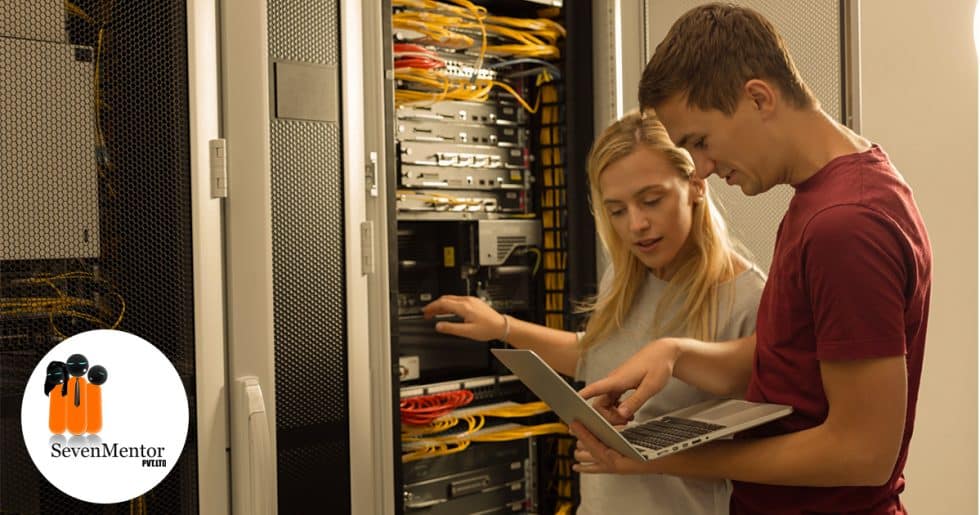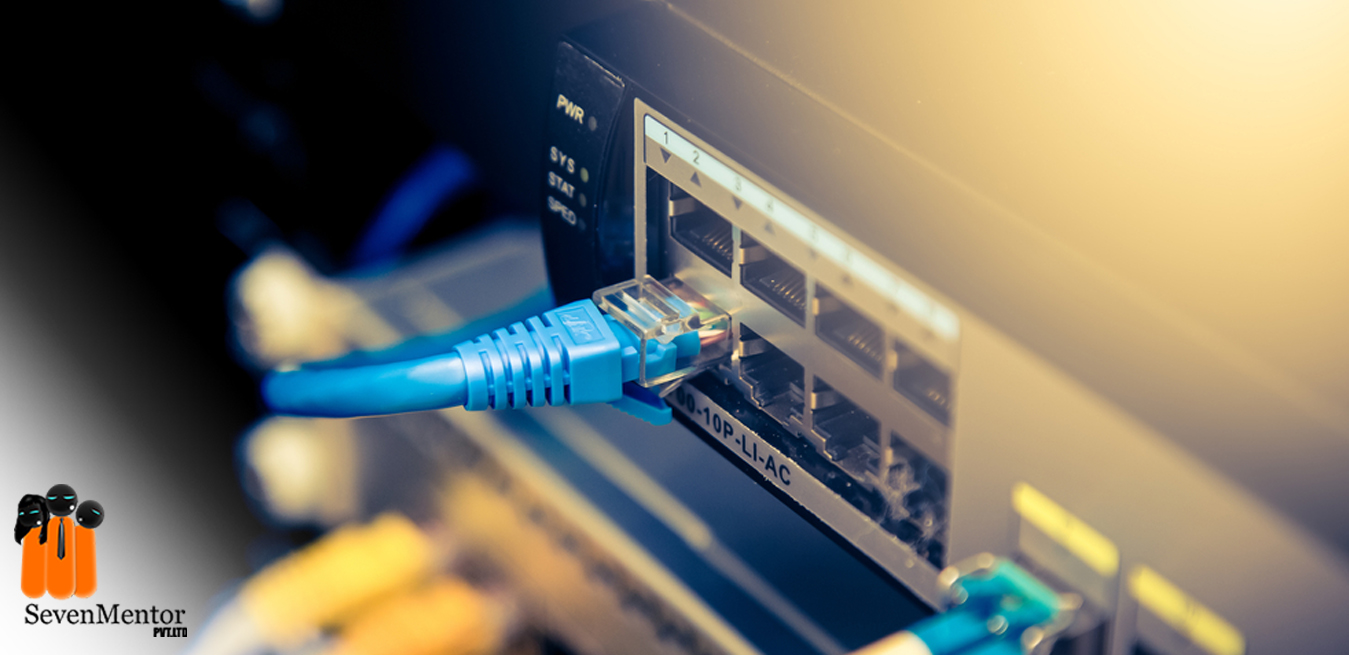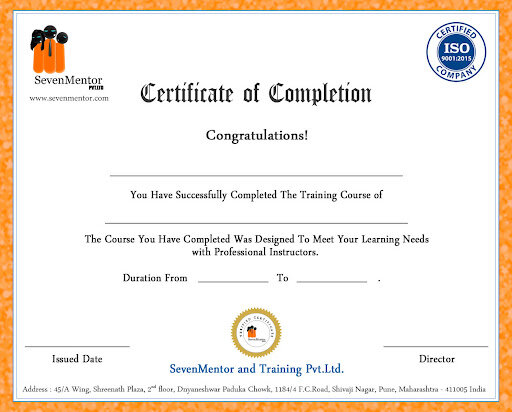CCNA
Passion for learning is quite fruitful and it never ceases your growth. Associate (CCNA) is a well-known IT certification for individuals just starting in their IT professions. Cisco created the CCNA certification course in Gandhinagar, which is perfect for people involved in digital transformation projects that aid in business growth and new-age infrastructure.
Call The Trainer
Batch Timing
- Regular: 2 Batches
- Weekends: 2 Batches
Request Call Back
Class Room & Online Training Quotation
About CCNA
This Cisco Certified Network Associate (CCNA) certification course Gandhinagar evaluates your knowledge and skills in networking foundations, IP connection, security, and automation, among other topics. A CCNA's annual income in India is projected to be $19.552. This figure indicates the median, which is the midpoint of the salary ranges calculated by our proprietary Total Pay Estimate algorithm and based on data from our users. The "Most Likely Range" represents values that fall between the 25th and 75th percentiles of all possible values. Cisco Certified Network Associate Security (CCNA Security) professionals are educated to protect the network from potential threats. The Cisco Certified security associate works on the security infrastructure's development. They can also detect threats and vulnerabilities in an organization's network in advance. The network associate's talents are used to secure and develop a dependable Cisco network infrastructure. All employees must be CCNA training in Gandhinagar Security Certified. This validates the network associate's ability to work on a Cisco network. The network security specialist is in charge of all key security technologies. In addition, they troubleshoot, install, and monitor network equipment. The network security associate is also in charge of securing the network's data. Subordinate-level authentication is performed by the Cisco Certified Network Associate (Security).
Job Duties of a Cisco Certified Network Security Associate
A Cisco Certified Network Associate-primary Security role is to protect an organization's network from various forms of cyberattacks.
Data validation, drawing markup, process records, device counts, and the invoice of materials development are among the tasks. Their opportunities for advancement will vary depending on the needs of the consumer and the requirements of the project.
They may be asked to assist security teams with research and the recommendation of new security techniques that address specific threat alarms. Senior security technicians' advanced capabilities include forensic data breach analysis and malware reverse engineering.
It's no surprise that Cisco rules the networking sector. For decades, Cisco has been a market leader in routing, switching, and other network-related technologies. Cisco also provides a certification known as Cisco Certified Network Associate (CCNA).
It is a Cisco-sponsored certification for network engineers that covers security, switching technologies, and routing protocols. The CCNA credential is designed to improve, enhance, and assess a person's networking knowledge.
The certification confirms the holder's ability to install, maintain, secure, operate, and troubleshoot networks in an organisational setting. The Cisco CCNA certification provides IT workers with a broad understanding of networking fundamentals. It allows networking professionals to keep current on their skills and knowledge. It will aid the credential bearer in obtaining professional progression, promotions, and new work.
The CCNA certification in Gandhinagr will be worthwhile in terms of money gained and employment options available with this credential, but it will not be easy! MyComputerCareer provides CCNA classes in Gandhinagar certification training as part of its cybersecurity specialist curriculum. For additional information, please contact us immediately!
The Benefits of CCNA Certification
Cisco certified network associates are specialists who can manage Cisco equipment, solve Cisco hardware and software issues, and configure Cisco networks. Among the several advantages that make the CCNA training in Gandhinagar Certification worthwhile are improved abilities and a broader range of employment options.
You will also improve your Cisco networking abilities, which will benefit you in your career. You can utilize this knowledge to master the complex concepts of monitoring and correction. CCNA classes in Gandhinagar credential could help you obtain access to a variety of job prospects. After passing the CCNA exam, you will be able to earn and negotiate a greater wage than other IT professionals vying for the same position. The networking world of today is rapidly changing. SDN (Software-defined networking) and cloud are two hot emerging technologies. These technologies have transformed the networking industry by introducing a wide range of job duties. As a result, the CCNA certification allows you to fill the hole left by these changes in your profession.
What Are the Job Roles and Salary Prospects for the CCNA-Certified?
Cisco certified personnel are always in great demand since Cisco systems and Cisco-related technologies have become industry standards. You can apply for vacancies in computer science, information technology director, systems engineer, network administrator, system administrator, senior system engineer, network security engineer, cyber security analyst, senior systems engineer, and information technology specialist after earning the CCNA.
The Cisco Certified Network Associate (CCNA) certification verifies a user's knowledge and skills in network administration. This degree typically earns $80,000 per year.
Cisco-certified specialists have demonstrated a deep understanding of Cisco routers and switches, many employees choose them. The great majority of Fortune 500 companies rely on Cisco networking equipment.
Who Should get CCNA?
Cisco certifications are designed for Cisco professionals at all levels. Cisco created the Cisco Certified Network Associate (CCNA) certification to assist anyone who likes to work in networking.
The CCNA is also a good place to start if you want to transition into IT from another field or if you want to augment your current job with additional training. Cisco certifications are industry-recognized credentials that can aid in your career advancement.
The Cisco Certified Network Associate certification is an ideal entry point into Cisco networking technology and will serve as the foundation for other Cisco certifications such as the CCNP and CCDP courses.
There is no prerequisite for a specific certificate before taking the CCNA exam, therefore you can take it without one.
What Does the CCNA Certification Entail?
Cisco developed the Cisco Certified Network Associate (CCNA) certification to serve as a starting point for entry-level network professionals. The Cisco Certified Network Associate (CCNA) curriculum verifies knowledge of installation, troubleshooting, and support in small routed systems using Cisco devices. Cisco's basic curriculum consists of two tests covering networking fundamentals, installation/troubleshooting abilities, Cisco routing and switching, and Cisco routing and switching.
The CCNA Training in Gandhinagar covers a wide range of topics important for networking professionals. This Cisco certification covers networking principles, IP connection, and other IP services (DHCP, DNS, SNMP, FTP, and so on), as well as security fundamentals, automation, and programmability.
Online Classes
Students' learning has to be quality. New technology trends and concepts following it are a lot and organizations using online CCNA Courses in Gandhinagar has in multiple ways helped. SevenMentor & Training Pvt. Ltd.. enriches students' skills in technology. Our daily activities and tests help you improve yourselves. Graduates tending to learn more are welcome to the habitat of education. We support placements and other courses essential for students' careers.
Course Eligibility
There is no such criteria for joining Online CCNA Training. CCNA is an associate or entry level certification exam for those who are planning to build their career in the most demanding field of networking.
- 10+2 students can go for CCNA Training
- Undergraduates and graduates
- Professionals who want switch
- Those who are interested in Networking
Syllabus of CCNA
Cisco Certified Network Associate (200-301)
Exam Description: The Cisco Certified Network Associate (CCNA) Routing
and Switching composite exam (200-301) is a 90-minute, 50–60 question
assessment that is associated with the CCNA Routing and Switching
certification. This exam tests a candidate's knowledge and skills related to
network fundamentals, LAN switching technologies, IPv4 and IPv6 routing
technologies, WAN technologies, infrastructure services, infrastructure
security, and infrastructure management .The following topics are general guidelines for the content likely to be
included on the exam. However, other related topics may also appear on any
specific delivery of the exam. In order to better reflect the contents of the
exam and for clarity purposes, the guidelines below may change at any time
without notice.
15% 1.0 Network Fundamentals
21% 2.0 LAN Switching Technologies
23% 3.0 Routing Technologies
10% 4.0 WAN Technologies
10% 5.0 Infrastructure Services
11% 6.0 Infrastructure Security
10% 7.0 Infrastructure Management
- 1.0 Network Fundamentals
- 1.1. Compare and contrast OSI and TCP/IP models
- 1.2. Compare and contrast TCP and UDP protocols
- 1.3. Describe the impact of infrastructure components in an enterprise network
- 1.3.1. Firewalls
- 1.3.2. Access points
- 1.3.3. Wireless controllers
- 1.4. Describe the effects of cloud resources on enterprise network architecture
- 1.4.1. Traffic path to internal and external cloud services
- 1.4.2. Virtual services
- 1.4.3. Basic virtual network infrastructure
- 1.5. Compare and contrast collapsed core and three-tier architectures
- 1.6. Compare and contrast network topologies
- 1.6.1. Star
- 1.6.2. Mesh
- 1.6.3. Hybrid
- 1.7. Select the appropriate cabling type based on implementation requirements
- 1.8. Apply troubleshooting methodologies to resolve problems
- 1.8.1. Perform and document fault isolation
- 1.8.2. Resolve or escalate
- 1.8.3. Verify and monitor resolution
- 1.9. Configure, verify, and troubleshoot IPv4 addressing and subnetting
- 1.10. Compare and contrast IPv4 address types
- 1.10.1. Unicast
- 1.10.2. Broadcast
- 1.10.3. Multicast
- 1.11. Describe the need for private IPv4 addressing
- 1.12. Identify the appropriate IPv6 addressing scheme to satisfy< addressing requirements in a LAN/WAN environment
- 1.13. Configure, verify, and troubleshoot IPv6 addressing
- 1.14. Configure and verify IPv6 Stateless Address Auto Configuration
- 1.15. Compare and contrast IPv6 address types
- 1.15.1. Global unicast
- 1.15.2. Unique local
- 1.15.3. Link local
- 1.15.4. Multicast
- 1.15.5. Modified EUI 64
- 1.15.6. Autoconfiguration
- 1.15.7. Anycast
- LAN Switching Technologies
- 2.1. Describe and verify switching concepts
- 2.1.1. MAC learning and aging
- 2.1.2. Frame switching
- 2.1.3. Frame flooding
- 2.1.4. MAC address table
- 2.2. Interpret Ethernet frame format
- 2.3. Troubleshoot interface and cable issues (collisions, errors, duplex, speed)
- 2.4. Configure, verify, and troubleshoot VLANs (normal/extended range) spanning multiple switches
- 2.4.1. Access ports (data and voice)
- 2.4.2. Default VLAN
- 2.5. Configure, verify, and troubleshoot interswitch connectivity
- 2.5.1. Trunk ports
- 2.5.2. Add and remove VLANs on a trunk
- 2.5.3. DTP, VTP (v1&v2), and 802.1Q
- 2.5.4. Native VLAN
- 2.6. Configure, verify, and troubleshoot STP protocols
- 2.6.1. STP mode (PVST+ and RPVST+)
- 2.6.2. STP root bridge selection
- 2.7. Configure, verify and troubleshoot STP related optional features
- 2.7.1. PortFast
- 2.7.2. BPDU guard
- 2.8. Configure and verify Layer 2 protocols
- 2.8.1. Cisco Discovery Protocol
- 2.8.2. LLDP
- 2.9. Configure, verify, and troubleshoot (Layer 2/Layer 3) EtherChannel
- 2.9.1. Static
- 2.9.2. PAGP
- 2.9.3. LACP
- 2.10. Describe the benefits of switch stacking and chassis aggregation
- 3.0 Routing Technologies
- 3.1. Describe the routing concepts
- 3.1.1. Packet handling along the path through a network
- 3.1.2. Forwarding decision based on route lookup
- 3.1.3. Frame rewrite
- 3.2. Interpret the components of a routing table
- 3.2.1. Prefix
- 3.2.2. Network mask
- 3.2.3. Next hop
- 3.2.4. Routing protocol code
- 3.2.5. Administrative distance
- 3.2.6. Metric
- 3.2.7. Gateway of last resort
- 3.3. Describe how a routing table is populated by different routing information sources
- 3.3.1. Admin distance
- 3.4. Configure, verify, and troubleshoot inter-VLAN routing
- 3.4.1. Router on a stick
- 3.4.2. SVI
- 3.5. Compare and contrast static routing & dynamic routing
- 3.6. Compare and contrast distance vector and link state routing protocols
- 3.7. Compare and contrast interior and exterior routing protocols
- 3.8. Configure, verify, and troubleshoot IPv4 and IPv6 static routing
- 3.8.1. Default route
- 3.8.2. Network route
- 3.8.3. Host route
- 3.8.4. Floating static
- 3.9. Configure, verify, and troubleshoot single area and multi-area OSPFv2 for IPv4 (excluding authentication, filtering, manual summarization, redistribution, stub, virtual-link, and LSAs)
- 3.10. Configure, verify, and troubleshoot single area and multi-area OSPFv3 for IPv6 (excluding authentication, filtering, manual summarization, redistribution, stub, virtual-link, and LSAs)
- 3.11. Configure, verify, and troubleshoot EIGRP for IPv4 (excluding authentication, filtering, manual summarization redistribution, stub)
- 3.12. Configure, verify, and troubleshoot EIGRP for IPv6 (excluding authentication, filtering, manual summarization redistribution, stub)
- 3.13. Configure, verify, and troubleshoot RIPv2 for Ipv4 (excluding authentication, filtering manual summarization, redistribution)
- 3.14. Troubleshoot basic Layer 3 end-to-end connectivity issues
- 4.0 WAN Technologies
- 4.1. Configure and verify PPP and MLPPP on WAN interfaces using local authentication
- 4.2. Configure, verify, and troubleshoot PPPoE client-side interfaces using local authentication
- 4.3. Configure, verify, and troubleshoot GRE tunnel connectivity
- 4.4. Describe WAN topology options
- 4.4.1. Point-to-point
- 4.4.2. Hub and spoke
- 4.4.3. Full mesh
- 4.4.4. Single vs dual-homed
- 4.5. Describe WAN access connectivity options
- 4.5.1. MPLS
- 4.5.2. Metro Ethernet
- 4.5.3. Broadband PPPoE
- 4.5.4. Internet VPN (DMVPN, site-to-site VPN, client VPN)
- 4.6. Configure and verify single-homed branch connectivity using eBGP IPv4 (limited to peering and route advertisement using Network command only)
- 4.7. Describe basic QoS concepts
- 4.7.1. Marking
- 4.7.2. Device trust
- 4.7.3. Prioritization
- A. Voice
- B. Video
- C. Data
- 4.7.4. Shaping
- 4.7.5. Policing
- 4.7.6. Congestion management
- 5.0 Infrastructure Services
- 5.1. Describe DNS lookup operation
- 5.2. Troubleshoot client connectivity issues involving DNS
- 5.3. Configure and verify DHCP on a router (excluding static reservations)
- 5.3.1. Server
- 5.3.2. Relay
- 5.3.3. Client
- 5.3.4. TFTP, DNS, and gateway options
- 5.4. Troubleshoot client- and router-based DHCP connectivity issues
- 5.5. Configure, verify, and troubleshoot basic HSRP
- 5.5.1. Priority
- 5.5.2. Preemption
- 5.5.3. Version
- 5.6. Configure, verify, and troubleshoot inside source NAT
- 5.6.1. Static
- 5.6.2. Pool
- 5.6.3. PAT
- 5.7. Configure and verify NTP operating in a client/server mode
- 6.0 Infrastructure Security
- 6.1. Configure, verify, and troubleshoot port security
- 6.1.1. Static
- 6.1.2. Dynamic
- 6.1.3. Sticky
- 6.1.4. Max MAC addresses
- 6.1.5. Violation actions
- 6.1.6. Err-disable recovery
- 6.2. Describe common access layer threat mitigation techniques
- 6.2.1. 802.1x
- 6.2.2. DHCP snooping
- 6.2.3. Nondefault native VLAN
- 6.3. Configure, verify, and troubleshoot IPv4 and IPv6 access list for traffic filtering
- 6.3.1. Standard
- 6.3.2. Extended
- 6.3.3. Named
- 6.4. Verify ACLs using the APIC-EM Path Trace ACL Analysis tool
- 6.5. Configure, verify, and troubleshoot basic device hardening
- 6.5.1. Local authentication
- 6.5.2. Secure password
- 6.5.3. Access to device
- A. Source address
- B. Telnet/SSH
- 6.5.4. Login banner
- 6.5.5. Describe device security using AAA with TACACS+ and RADIUS
- 7.1. Configure and verify device-monitoring protocols
- 7.1.1. SNMPv2
- 7.1.2. SNMPv3
- 7.1.3. Syslog
- 7.2. Troubleshoot network connectivity issues using ICMP echo-based IP SLA
- 7.3. Configure and verify device management
- 7.3.1. Backup and restore device configuration
- 7.3.2. Using Cisco Discovery Protocol or LLDP for device discovery
- 7.3.3. Licensing
- 7.3.4. Logging
- 7.3.5. Timezone
- 7.3.6. Loopback
- 7.4. Configure and verify initial device configuration
- 7.5. Perform device maintenance
- 7.5.1. Cisco IOS upgrades and recovery (SCP, FTP, TFTP, and MD5 verify)
- 7.5.2. Password recovery and configuration register
- 7.5.3. File system management
- 7.6. Use Cisco IOS tools to troubleshoot and resolve problems
- 7.6.1. Ping and traceroute with extended option
- 7.6.2. Terminal monitor
- 7.6.3. Log events
- 7.6.4. Local SPAN
- 7.7. Describe network programmability in enterprise network architecture
- 7.7.1. Function of a controller
- 7.7.2. Separation of control plane and data plane
- 7.7.3. Northbound and southbound APIs
Trainer Profile of CCNA
At SevenMentor, you can take either the teacher drove online training or classroom training. Aside from this, SevenMentor additionally offers corporate training for associations to upskill their workforce. All mentors at SevenMentor have a years important industry experience, and they have been effectively functioning as advisors in a similar space, which has made them topic specialists. You can have a demo lecture to check the quality of our trainers.
- Certified Professionals with more than 8+ Years of Experience
- Trained more than 2000+ students in a year
- Strong Theoretical & Practical Knowledge in their domains
- Expert level Subject Knowledge and fully up-to-date on real-world industry applications
CCNA Exams & Certification
SevenMentor Certification is Accredited by all major Global Companies around the world. We provide after completion of the theoretical and practical sessions to fresher’s as well as corporate trainees.
Our certification at SevenMentor is accredited worldwide. It increases the value of your resume and you can attain leading job posts with the help of this certification in leading MNC’s of the world. The certification is only provided after successful completion of our training and practical based projects.
Proficiency After Training
- Describe how Components Operate, identifying Important Elements, a function of network Elements, as well as the OSI reference model
- Employing the host-to-host Parcel delivery process, Clarify Problems related to increasing traffic on an Ethernet LAN and identify Changed LAN technology Alternatives into Ethernet networking Problems
- Describe the reasons for Expanding the reach of a LAN as well as the methods Which Can Be Utilized, with a focus on RF wireless Accessibility
- Explain the reasons for Linking networks Using routers and the Way routed networks transmit Information via networks using TCP / IP
- Explain the Use of WANs, the Significant Apparatus of WANs, Also configure PPP encapsulation, static and dynamic routing, PAT, and RIP routing
- Utilize the command-line Port to Detect neighbors on the Community and manage the router startup and Configuration
Key Features
Skill level
From Beginner to Expert
We are providing Training to the needs from Beginners level to Experts level.
Course Duration
12 weeks
Course will be 90 hrs to 110 hrs duration with real-time projects and covers both teaching and practical sessions.
Total Learners
2000+ Learners
We have already finished 100+ Batches with 100% course completion record.
Frequently Asked Questions
Batch Schedule
| DATE | COURSE | TRAINING TYPE | BATCH | CITY | REGISTER |
|---|---|---|---|---|---|
| 29/04/2024 |
CCNA |
Online | Regular Batch (Mon-Sat) | Gandhinagar | Book Now |
| 30/04/2024 |
CCNA |
Online | Regular Batch (Mon-Sat) | Gandhinagar | Book Now |
| 27/04/2024 |
CCNA |
Online | Weekend Batch (Sat-Sun) | Gandhinagar | Book Now |
| 27/04/2024 |
CCNA |
Online | Weekend Batch (Sat-Sun) | Gandhinagar | Book Now |
Students Reviews
Several of the most interesting classes I've ever taken. Trainers were quite helpful and provided excellent coaching. My career path had left me completely bewildered.
- Rutuja Mahajan
The CCNA course from SevenMentor was excellent. Extraordinary training sessions helped me to expand my understanding. SevenMentor Institute, thank you so much.
- Parekh Kutty
It's a laid-back atmosphere. Stable and easy-to-understand classes. Not only did I obtain new skills, but I also made new friends among the trainers.
- Mina Nibas
Course video & Images



Corporate Training
SevenMentor & Training Pvt. Ltd's Corporate CCNA training in Gandhinagar is not limited to one. Those with prior experience can enrol in Online CCNA Course in Gandhinagar and gain skills quickly. SevenMentor & Training Pvt. Ltd offers both classroom training and on-the-job mentoring. As a result, those who registered can get hired or perform well in their particular organisations.
Our Placement Process

Eligibility Criteria

Placements Training

Interview Q & A

Resume Preparation

Aptitude Test

Mock Interviews

Scheduling Interviews

Job Placement

Related Courses
Have a look at all our related courses to learn from any location
CCNA Security class is the greatest training tool for engineers following the Cisco Certified Network Associate Security (CCNA Security) certification.
The CCNP Certification is just one among the vital certifications from Cisco a media professional must want to proceed in his profession.
An Advanced level in cisco certification-networking training is intended for professionals with prior experience in the networking field.
Request For Call Back
Class Room & Online Training Quotation

